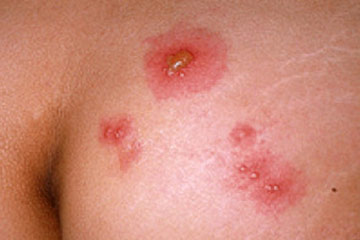Human Papillomavirus and Genital Warts. Prevention
Prevention
The best way to prevent getting an HPV infection is to avoid direct contact with the virus, which is transmitted by skin-to-skin contact. If you or your sexual partner has warts that are visible in the genital area, you should avoid any skin-to skin and sexual contact until the warts are treated.
HPV vaccines
Two HPV vaccines, Gardasil and Cervarix, are approved by the Food and Drug Administration. Both vaccines are highly effective in preventing persistent infection with HPV types 16 and 18, two "high-risk" HPVs that cause most (70 percent) of cervical cancers. Gardasil is also effective against types 6 and 11, which cause virtually all (90 percent) of genital warts.
Both vaccines are licensed, safe, and effective for females ages 9 through 26 years. The Centers for Disease Control and Prevention (CDC) recommends that all girls who are 11 or 12 years old get the 3 doses of either brand of HPV vaccine to protect against cervical cancer and precancer.
Gardasil is also licensed for boys and young men ages 9 through 26 years. Males may choose to get this vaccine to prevent genital warts.
Neither Gardasil nor Cervarix has been proven to provide complete protection against persistent infection with other HPV types, some of which also can cause cervical cancer. Therefore, about 30 percent of cervical cancers and 10 percent of genital warts will not be prevented by the current vaccines. HPV vaccines do not prevent other sexually transmitted diseases, nor do they treat HPV infection or cervical cancer.
For federal HPV vaccine recommendations, go to the CDC Advisory Committee on Immunization Practices website at www.cdc.gov/vaccines/recs/acip. In addition, the National Cancer Institute and CDC have more information on the HPV vaccine at www.cancer.gov/cancertopics/hpv-vaccines andwww.cdc.gov/vaccines/vpd-vac/hpv/default.htm, respectively.
Historically, research studies have not confirmed that male latex condoms prevent transmission of HPV. Recent studies, however, demonstrate that consistent condom use by male partners suggests strong protection against low and high risk types of HPV infection in women. Unfortunately, many people who don’t have symptoms don’t know that they can spread the virus to an uninfected partner.
Source
National Institute of Allergy and Infections Diseases
http://www.niaid.nih.gov/topics/genitalwarts/Pages/default.aspx
Related Topics
-
Human Papillomavirus
-
Human Papillomavirus Vaccines: Questions and Answers
-
Human Papilloma Virus Signs and Symptoms
-
Human Papillomavirus Screening
-
Cervical Cancer Screening Tests
-
What Does My Pap Test Result Mean?
-
What Does My HPV Test Result Mean?
-
HPV Test FDA's Approval
-
Human Papillomavirus Treatment
-
Human Papillomavirus Prevention
-
Human Papillomavirus and Men
-
HPV and Men
-
Human Papillomavirus Infection Treatment
-
Human Papillomavirus and Genital Warts
-
Human Papillomavirus Associated Cancers
United States, 2004–2008 -
Preventing Cervical Cancer Worldwide (PDF document)






